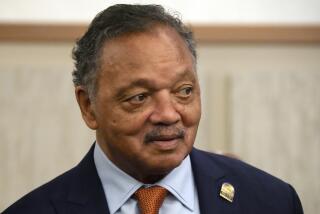Jackson, Stumping With Brown, Questions Fairness of Flat Tax
- Share via
NEW YORK — Seeking to enhance his stature with grass-roots activists in black and labor communities, Edmund G. (Jerry) Brown Jr. shared his presidential campaign podium Wednesday with the Rev. Jesse Jackson, who seized the moment to raise questions about the fairness of Brown’s flat-tax proposal.
At a news conference with the former California governor, Jackson also said he was flattered by Brown’s repeated pledge to pick him as his running mate. But Jackson said he was unwilling to commit himself just yet.
“The issue of who will be on the ticket, for me, is a much later question,” Jackson said, suggesting he would like to be asked by either Brown or Brown’s rival, Bill Clinton, when they return to New York for the Democratic National Convention in July. “If, by chance, the party’s nominee were to make such a request and the convention were to ratify it, I would be honored to accept it.”
Jackson said Clinton has not talked with him about the vice presidency and, he added: “I have not sought that conversation with anybody.”
Then the going got tougher. Jackson was asked if he supported Brown’s controversial plan to replace the federal tax structure--income, estate, corporate and Social Security taxes--with a 13% flat rate on income and a 13% value-added tax on manufactured goods. “I think it has to be modified,” he said.
As the question was being posed, Brown stood, grim-faced, at Jackson’s left elbow and noticeably stiffened as the civil rights leader answered.
Apparently sensing Brown’s discomfort, Jackson attempted to mute his response by adding: “Any tax proposal has to be put into perspective. It has to go through the rigors of the House Ways and Means Committee.”
Pressed further, Jackson said his objections centered on whether the flat tax would be fair to poor people. “The simplicity part is appealing,” he said, “but the details that would protect fairness must be a feature of it.”
Clinton has made an issue of the flat tax, contending it would be unfair to the poor and that it wouldn’t bring in enough money to run the country.
Ostensibly, the Jackson-Brown show was a voter registration drive to announce they had added 102,000 new voters to the rolls from this city’s five boroughs.
But the real, political purpose was a less-than-subtle effort by Brown’s campaign team to garner “free media”--news coverage--showcasing Brown and Jackson to solicit support from the city’s black voters and organized labor.
Jackson’s unsuccessful campaigns for the Democratic nomination in 1984 and 1988 attracted much of the same constituency that Brown hopes will send him to the White House later this year.
The overwhelmingly positive response at the rally came as an uplifting counterpoint to other, less encouraging, developments for Brown.
Former President Jimmy Carter endorsed Clinton, calling him “an honest, decent, competent, idealistic, practical man.” Carter criticized Brown for running a campaign that said has been “almost 100% negative.”
A new, statewide poll showed Brown with 26% to Clinton’s 36.7%, with less than a week remaining before Tuesday’s primary. The poll results also suggested that Brown’s negative rating had risen by about 10 percentage points during the last week. Clinton has focused his attacks on the flat tax plan in an effort to raise those negatives.
More to Read
Get the L.A. Times Politics newsletter
Deeply reported insights into legislation, politics and policy from Sacramento, Washington and beyond. In your inbox twice per week.
You may occasionally receive promotional content from the Los Angeles Times.










